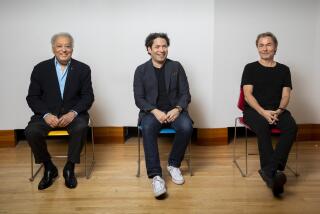Music and Dance Reviews : Duo-Pianists Cipa and Misha Dichter at Royce Hall
Cleverly arranged and immaculately executed, the intriguing program of works for two pianos played by Cipa and Misha Dichter at UCLA on Wednesday night had to fascinate.
But to captivate the listener, it needed a lot more energy than the attractive, still-youngish couple--who have been married to each other for more than 21 years--seemed able to muster at this Royce Hall recital.
Being repeated from another local appearance four years ago, the Dichters’ playing of Claude Debussy’s transcription of Six Etudes in Form of a Canon by Schumann, and of Leonard Bernstein’s transcription of Copland’s “El Salon Mexico,” proved again deeply impressive.
The unfamiliar Schumann pieces seemed to melt in the ear, after making all their poetic points. But the Copland work, though neatly delivered, lacked the natural vehemence one associates with this music.
The rest of the agenda commanded interest but emerged uncompelling in performance. Thoroughly meshed, the playing of the two pianists--who perform with scores rather than from memory--shows good taste, untroubled virtuosity and well-considered interpretive choices. Soundwise, however, it can be monochromatic at all dynamic levels; musically, it lacks urgency.
The strongest performance--and, one felt, it might have been a stunner had the couple put away their scores and just ripped into their respective pianos--came in Rachmaninoff’s Symphonic Dances, in the composer’s own, two-piano original version. Arguably Rachmaninoff’s masterpiece, the work can take one’s breath away with its post-Romantic lyricism and the sweep of its drama.
The Dichters made it their own, though without that extra measure of conviction that would have burned it in the memory.
The remainder of the program consisted of Busoni’s complicated transcription of Mozart’s Fantasia for Musical Clock, K. 608, and the unnecessary transcription, again by Debussy, of Saint-Saens’ Introduction and Rondo Capriccioso. Both received careful, if hardly revelatory, readings.
More to Read
The biggest entertainment stories
Get our big stories about Hollywood, film, television, music, arts, culture and more right in your inbox as soon as they publish.
You may occasionally receive promotional content from the Los Angeles Times.










